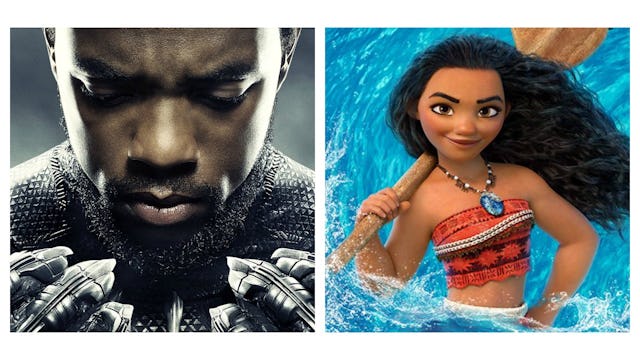PSA: Don't Let Your Kids Dress Up In These Costumes

If your kids are like mine, Halloween is a big freaking deal.
Since the beginning of summer (no, I’m not kidding), my four children have been discussing what costume they will choose. It changes no fewer than ten times per child. Once the beginning of October rolled around, I told them it’s time to “pick and stick.”
And apparently, I’m not the only mom with a family full of Halloween-on-the-brain children. The main topic I’m seeing in mommy social media groups right now is Halloween costumes. And most recently, the big debate is whether or not kids should dress up as Moana.
For some parents, Moana is just a character in a cool movie. We need to just let kids be kids, just like when we were children and dressed up as whatever or whomever we wanted, loving every minute of our amped-up on sugar and artificial food dye bliss. I mean really, our children aren’t trying to send a message or cling to an agenda in order to make a statement. The PC police need to chill the f out.
But for others, Moana, even as an animated, fiction character, is a person of color who represents, even loosely, a culture and a history that shouldn’t be appropriated by children. We should step back and appreciate the culture, not impersonate it for $24.99. Even Disney themselves pulled Maui’s costume after accusations of appropriation and brown face circulated on social media.
The arguments leave modern parents perplexed. What’s the right answer here?
As a mom of four children of color, I feel the answer is simple. Someone’s culture isn’t up for grabs as another person’s costume, even if that person is a child.
Take, for example, this past spring. One of my daughters was preparing for her ballet recital. The dance team was preparing a Disney princess mash-up in which each girl would choose a princess to portray. My daughter had joined the group late in the season and all the other princesses had already been assigned. There were only two choices left, one of them being Pocahontas.
Given all that has happened to indigenous peoples in our country at the hands of greedy white people, and the more recent debate over the Dakota Access Pipeline, I was immediately adamant that my daughter not portray Pocahontas. I had visited four reservations in my college years, working to repair homes, and I had a deep appreciation for the people I was honored to meet.
Thankfully, the director of the program agreed. Though I still wondered, why is appropriation or impersonation of another person’s culture even an option in 2018? When do we let loose of our long-held white privilege where we believe that we have the right to anything and everything we set our eyes on no matter how it makes another person feel?
Since becoming a mom to four children, all of whom are black, I admit that cultural appropriation disturbs me. Despite current trends, you won’t find a mini version of a teepee in my kid’s reading nook in their bedrooms, I don’t buy my toddler daughter shoes resembling moccasins, and I certainly don’t purchase department store dream catchers to decorate my walls. Why? Because these things aren’t part of our culture. Therefore, I feel we shouldn’t own these items as if we put any of our own blood, sweat, or tears into their creation.
I cringe every time my children’s own culture is appropriated, such as when yet another Kardashian wearing her hair in cornrows. Cornrows are a historical, cultural hairstyle that protects African American hair. Newsflash: the Kardashians are not African American. And when they steal a hairstyle that doesn’t belong to them, slap it on Instagram, and garner millions of likes, they are earning attention and money for their brand. That’s the very definition of appropriation.
Parents have also been asking, what about Black Panther? The movie was wildly popular among audiences of all races, and like Moana, Black Panther costumes are selling out left and right this month.
Wakanda, the land inhabited by T’Challa (aka Black Panther) and his people, is a made-up African country. However, Wakanda has all the hallmarks of African culture and magnifies a historical depth that isn’t present in most other superhero films.
To put it frankly, the movie is unapologetically black.
So while my seven-year-old daughter will proudly portray Black Panther this Halloween, I don’t think the white kid sitting next to her in class should. For the same reasons why a child not of Polynesian descent should not dress up as Moana.
For those of you still sighing, let me put it this way: the Halloween costume decision comes down to whether or not you see another person’s culture as equal and worthy of consideration and appreciation. You see, not everything is ours to take.
And that should be reason enough to choose a different costume.
This article was originally published on